 |
L'Eglise Aristotelicienne Romaine The Roman and Aristotelic Church
Forum RP de l'Eglise Aristotelicienne du jeu en ligne RR
Forum RP for the Aristotelic Church of the RK online game
 
|
| Voir le sujet précédent :: Voir le sujet suivant |
| Auteur |
Message |
Kalixtus
Cardinal


Inscrit le: 24 Fév 2013
Messages: 15421
Localisation: Roma, Palazzo Doria-Pamphilj
|
 Posté le: Lun Fév 24, 2025 8:49 pm Sujet du message: [RP] Pontifical Requiem for Cardinal Urbain Mastiggia Posté le: Lun Fév 24, 2025 8:49 pm Sujet du message: [RP] Pontifical Requiem for Cardinal Urbain Mastiggia |
 |
|

DEUS VULT

Pontifical Requiem for Cardinal Urbain Mastiggia
Sunday 23rd of February
St. Titus Basilica
L’aube était encore pâle sur les places de Rome lorsque le cardinal Kalixtus revêtit ses habits liturgiques. La chasuble brodée d’or, lourde de traditions séculaires, retombait en plis majestueux sur ses épaules. La dalmatique, traversée de pourpre, était bordée de délicates rinceaux de lys et portait les armoiries de la maison Mastiggia, un dernier hommage à son illustre lignage. Sur sa tête reposait la mitre, traversée de fils d’or aux reflets nacrés, et dans ses mains il tenait la crosse de saint Jean – un insigne de la dignité apostolique, qui était aujourd’hui aussi un symbole d’adieu.
La cathédrale Saint-Tite respirait cette majesté imposante que seul le temple de Dieu peut posséder. Les colonnes de marbre, telles des témoins silencieux de l’éternité, s’élevaient dans la pénombre du matin, tandis que l’immense coupole, sanctifiée par des myriades de prières, dominait l’ensemble tel un diadème céleste. Les torches, dressées sur de hauts candélabres, projetaient une lumière vacillante sur les mosaïques monumentales, dont les reflets dorés s’embrasaient dans le silence matinal comme un feu sacré.
Devant le maître-autel, là où la lumière éternelle flottait au-dessus du tabernacle, reposait le sarcophage du cardinal Urbain Mastiggia. Le bois d’un noir profond, d’un ébène des plus fins, était incrusté d’ornements d’argent – des figures angéliques, des mains jointes en prière, les armoiries de la Sainte Église. Un tapis, rouge carmin comme le sang des martyrs, s’étendait sous lui, son ultime couche sur cette terre. Entouré d’encens, dont les volutes parfumées s’élevaient telles des prières, le cardinal reposait en paix dans le Seigneur.
Le trône pontifical, d’or éclatant et d’ivoire, s’élevait au-dessus de la scène – le siège de saint Tite, d’où le vicaire du Dieu veillait sur l’Église. Le pape y prendrait-il place aujourd’hui ? Lui seul en déciderait.
Lorsque le cardinal Kalixtus s’avança vers l’autel, le visage grave, un silence solennel s’abattit sur l’assemblée. Les cloches sonnèrent, profondes et pesantes, au-dessus de la Ville Éternelle. Et en cet instant où la liturgie débutait, il sembla que le ciel et la terre ne faisaient plus qu’un, unis dans un battement de cœur divin.
C’était sa première messe en tant que maître de cérémonie dans cette basilique toute-puissante. Tout ici était plus grandiose, plus majestueux. Au centre de la colline vaticane trônait le véritable cœur de l’aristotélisme. Ici, l’éther divin se faisait sentir, tissant la création comme un esprit subtil, reliant toutes choses en une harmonie invisible. Une source d’énergie incommensurable, un feu vibrant d’âmes palpitantes qui unissait chacun dans une communion mystique.
Les rangs des évêques et cardinaux se rempliraient derrière lui.
Les rangs des fidèles s’empliraient devant lui.
Les cloches résonnaient à chaque coup, proclamant la sainteté de ce lieu jusqu’au plus profond des âmes présentes. Un adieu frémissant, empreint de dignité, de grâce et de la bénédiction du Dieu Tout-Puissant.
Digne d’un homme qui avait confié son service et sa vie aux mains du Créateur, et qui, jusqu’à son dernier souffle, avait prêché la présence de Dieu.
Le cardinal entendait la nef se remplir des voix multiples du chœur, s’élevant déjà et enveloppant le lieu dans une beauté et une mystique sublimes.
C’était cela, cette grâce immuable et cette beauté liturgique qui révélaient aux fidèles le mystère insondable de la Sainte Mère l’Église.

Dawn was still pale over the squares of Rome as Cardinal Kalixtus stepped into his liturgical vestments. The gold-embroidered chasuble, heavy with centuries of tradition, fell in solemn folds over his shoulders. The dalmatic, infused with deep purple, was edged with delicate lily patterns and bore the coat of arms of the House of Mastiggia—a final tribute of honor. Upon his head rested the mitre, interwoven with shimmering threads of gold, and in his hands he held the crosier of Saint John—an insignia of apostolic dignity, which today also became a symbol of farewell.
Saint Titus Cathedral itself exhaled that awe-inspiring majesty that only the house of God can possess. The marble columns, like silent witnesses of eternity, rose into the dim morning light, while the massive dome, hallowed by countless prayers, loomed over everything like a celestial crown. The torches, standing upon towering candelabra, cast flickering light upon the grand mosaics, whose golden reflections glowed in the early morning silence like a sacred fire.
Before the high altar, where the eternal light hovered above the tabernacle, the sarcophagus of Cardinal Urbain Mastiggia was laid in state. The deep black wood, made of the finest ebony, was adorned with silver inlays—angelic figures, praying hands, the coat of arms of the Holy Church. A carpet, crimson as the blood of martyrs, stretched beneath him, his final resting place on this earth. Surrounded by incense, whose fragrant clouds rose like prayers, the cardinal lay in the peace of the Lord.
The papal throne, radiant with gold and ivory, stood elevated above the scene—the seat of Saint Titus, from which the Vicar of God watched over the Church. Would the Pope take his place there today? That was his decision alone.
As Cardinal Kalixtus approached the altar with a solemn expression, a hushed silence settled over the gathered assembly. The bells rang out, deep and resonant, across the Eternal City. And in that moment, as the liturgy began, it felt as though heaven and earth had become one, bound in a single heartbeat.
This was his first Mass as master of ceremonies in this all-powerful basilica. Everything here was greater, more majestic. Here, at the heart of the Vatican Hill, lay the true center of Aristotelianism. Here, one could feel the divine ether, interweaving creation like a subtle spirit of omnipresent connection. An immeasurably vast source of energy, a fire of pulsating souls binding them all together.
The ranks of bishops and cardinals would fill behind him.
The ranks of the faithful would gather before him.
With each toll, the bells resounded with the sanctity of this place, reaching into the very foundations of the souls present. A trembling farewell, filled with dignity, grace, and the mercy of Almighty God.
Worthy of a man who had entrusted his service and his life into the hands of the Creator and who, until his final breath, had preached the presence of God.
The cardinal heard the choir space filling with many voices, already rising in unison, embalming the place in solemn beauty and mysticism.
This was what revealed to the faithful the immutable grace and beauty of the liturgy—the sacred mystery of the Holy Mother Church.
_________________

Dernière édition par Kalixtus le Mar Fév 25, 2025 2:34 am; édité 1 fois |
|
| Revenir en haut de page |
|
 |
Laodin

Inscrit le: 26 Mai 2017
Messages: 1255
Localisation: Entre fantaisie et rigueur
|
 Posté le: Lun Fév 24, 2025 11:53 pm Sujet du message: Posté le: Lun Fév 24, 2025 11:53 pm Sujet du message: |
 |
|
-----When the news of Urbain's death had come to Laodin, he first didn't believe it. Not a single, solemn word! And how could he? The man, vibrating with intense passion, had shown no sign of a decline in the past few months. Sure, he had been sick here and there, but not to the point of requestioning his life expectancy: when he showed up, it always was like a statue of power, rigid, but full of vitality, and dressed in the clothes of time. It sometimes seemed like he wasn't a member of the Church, but the Church itself, incarnating its very essence and spirit. So, he couldn't die in such an abrupt way; when a statue is about to fall down, you usually see moss and cracks. It would defy the laws of logic, as such as plunge the people who liked him in an even greater sorrow.
-----Laodin had done everything to refuse this fatality; he accused, in denial, Urbain's servant of being a liar, although not by pushing the boundaries; blamed his peers for their immediate acceptance of what seemed impossible; but in the end, a dead body had indeed been discovered in Urbain's house, and officially identified by the Church. The lie was no more, as for the joke, and the most unreasonable idea had become, in a sad turn of events, the exact voice of reason. He wasn't ready to accept it, but he had to nonetheless.
-----The funerals were to be hold in perhaps the greatest edifice of all, the Saint Titus basilica. He wanted to believe it was because Urbain had deeply marked the highest representants of the Church, but it was firstly, in a more detached way, because he had been a cardinal until the end of his life. Although stern, his real nature, all-loving and compassionate, required patience to discover it. In Laodin's case, he had been a friend all along: it was him, after all, who convinced him to become a bishop for the second time, despite his reticence of joining the Episcopal Assembly of France once again. He had found the right words, even if they didn't know each other back then. It was the start of an inspiring partnership, and one which definitely set him on the best tracks... Urbain had not been his first mentor, but one of the most important, and burying like was like burying an essential part of his life. All and everybody would continue as if nothing, but to him, the sky had become a bit darker.
-----Maybe he was still too young to accustom to death in their Church. Maybe, by comforting himself in his ideal world, he had become even more sensible to the grim reality of the outside. Nevertheless, everyone who really liked Urbain could do nothing but mourn him in this day. He wasn't just a cardinal, or even just an ex-Primate of France; he was a pure, albeit rough soul, and this soul would never bless them again by its presence - unless Urbain was a saint, and had become an angel himself. He deserved more than being reduced to his past functions, and Laodin hoped it would indeed be the case.
-----From what he heard, and would soon confirm, Kalixtus had been given the responsibility of giving this requiem; so there was nothing to fear about, as he had already done a great job at Blancastre's funerals. Laodin, behind him with all the bishops and cardinals, would support his first mass in the basilica in silence, filled with both sorrow and gratefulness.
-----This day resembled a bad dream, but a dream he had to suffer to provoke the good ones. And, in complete truth, the choirs were not so horrible to hear, if you focused on their sheer musicality and not what they were singing about... Gold for black, Kalixtus' solar appearance before Urbain's sarcophagus, as light would always find a way through dark, in this day or any other.
-----
-----Quand la nouvelle de la mort d'Urbain était parvenue aux oreilles de Laodin, celui-ci avait tout d'abord refusé d'y croire. Pas un seul, pas un infime, pas un ridicule petit mot ! Et comment aurait-il pu ? L'homme, qui avait toujours vibré d'une intense passion, n'avait montré aucun signe de déclin durant les derniers mois. Bien sûr, il lui était déjà arrivé de tomber malade, mais jamais au point de remettre en question ses prochains jours : lorsqu'il apparaissait, c'était toujours à la manière d'une imposante statue, rigide, mais pleine de vitalité, et vêtue des habits du temps. Parfois, il semblait même ne pas être un membre de l'Église, mais l'Église elle-même, incarnant son essence et son esprit. De fait, il ne pouvait pas mourir de manière aussi abrupte ; quand une statue est sur le point de s'effondrer, des fissures et de la mousse apparaissent généralement sur toute sa surface. Cela serait défier les lois de la logique, et plonger celles et ceux qui l'aimaient dans un encore plus grand tourment.
-----Laodin avait tout fait, absolument tout pour refuser cette fatalité ; il avait accusé, par déni, le serviteur d'Urbain d'être un menteur, bien qu'il ne fût jamais allé au-delà de l'acceptable ; il avait blâmé ses confrères d'avoir immédiatement accepté ce qui lui semblait impossible ; mais, à la fin des fins, un corps avait bel et bien été retrouvé dans la demeure d'Urbain, et officiellement identifié par l'Église. Le mensonge n'avait plus de raison d'être, de même pour ce qu'il croyait être une plaisanterie, et l'idée la plus déraisonnable était devenue, dans une triste tournure, la voix même de la raison. Il n'était pas prêt à l'accepter, mais il le devait quand même, à sa plus grande peine.
-----En guise de consolation, s'il pouvait y en avoir une, les funérailles se tiendraient dans ce qui était peut-être le plus grand des édifices religieux : la basilique Saint Titus. Il aurait voulu croire, de son âme triste, que le lieu avait été choisi par pure affection pour Urbain, mais cela était avant tout de par son statut de cardinal, qui l'avait suivi jusqu'à la fin de sa vie. Bien que sévère, sa vraie nature, celle d'un homme compatissant et concerné, demandait de la patience pour la découvrir. Dans le cas de Laodin, il avait été un ami du début à la fin : c'était lui, après tout, qui l'avait convaincu de devenir évêque pour une deuxième fois, malgré ses réticences à l'idée de rejoindre à nouveau l'Assemblée Épiscopale de France. Il avait su trouver les bons mots, même si tous deux ne se connaissaient pas encore. C'était là le début d'une collaboration des plus inspirantes, et une qui le mettrait définitivement sur les bons rails... Urbain n'avait pas été son premier mentor, mais l'un des plus importants, et l'enterrer aujourd'hui serait comme enterrer une partie essentielle de sa vie. Tout et tout le monde poursuivrait sa route comme si de rien n'était, mais pour Laodin, le ciel était d'ores et déjà devenu plus noir.
-----Peut-être était-il encore trop jeune pour s'habituer à la mort dans leur Église. Peut-être, en se réfugiant dans son monde idéal, était-il devenu encore plus sensible à la dure réalité de l'extérieur. Néanmoins, il était évident que tous ceux ayant apprécié Urbain le regretteraient en ce jour. Il n'était pas juste un cardinal, ou même juste un ex-Primat de France ; c'était une âme pure, bien qu'assez dure, et cette âme ne serait plus jamais là pour les bénir de sa présence - sauf si Urbain était un saint, et était devenu lui-même un ange. Il méritait bien plus que d'être réduit à ses fonctions passées, et Laodin espérait que cela serait bel et bien le cas.
-----De ce qu'il avait entendu, et confirmerait bientôt, Kalixtus s'était vu confier la responsabilité de donner ce requiem ; ainsi, il n'y avait rien à craindre, l'homme lui ayant déjà fait très bonne impression aux funérailles de Blancastre. Laodin, derrière lui avec l'ensemble des évêques et cardinaux, le soutiendrait dans sa première messe en silence, rempli de tristesse et de gratitude.
-----Ce jour ressemblait à un bien mauvais rêve, mais un rêve qu'il fallait subir afin d'en provoquer d'autres bien meilleurs. Et, pour dire la plus entière vérité, les chœurs n'étaient pas si horribles à écouter, si l'on oubliait le sujet du jour pour leur musicalité... De l'or pour du noir, l'apparence solaire de Kalixtus devant le sarcophage d'Urbain, tout comme la lumière trouverait toujours un chemin à travers l'obscurité, en ce jour comme dans un autre.
_________________

Dernière édition par Laodin le Dim Mar 09, 2025 10:28 pm; édité 2 fois |
|
| Revenir en haut de page |
|
 |
Branwyn

Inscrit le: 29 Mar 2023
Messages: 600
Localisation: Rom, Palazzetto Alessandrini
|
 Posté le: Mar Fév 25, 2025 11:15 am Sujet du message: Posté le: Mar Fév 25, 2025 11:15 am Sujet du message: |
 |
|
Branwyn, Bishop of Würzburg, held the sealed letter in her hands. The dark wax bore the papal seal – a message of the utmost importance. As she opened it, her eyes scanned the artfully curved lines.
Cardinal Urbain Mastiggia was dead.
She didn't know him personally, had never had the pleasure of speaking with him or learning from his wisdom firsthand. But she was familiar with his name, his writings had accompanied her, and his decisions had shaped the church.
His requiem would take place in the mighty St. Titus Basilica in Rome, celebrated by Cardinal Kalixtus himself.
The thought of Rome filled her with a strange mixture of awe and melancholy. She had visited the city many times, but never had her travels been so laden with sorrow.
She pictured the vast interior of the basilica – the tall marble columns rising into the subdued morning light, the dome floating above it all like a heavenly crown, the golden shimmer of the mosaics. And before the high altar, surrounded by rising incense, the cardinal's sarcophagus, as black as the depths of space.
The journey was arduous, the roads bumpy, but when the Eternal City appeared on the horizon, Branwyn felt a deep sense of calm. Rome had a strange effect on her – as if it were not just a city, but a living being, steeped in history and faith.
When she entered St. Titus Basilica, she was enveloped in the sublime silence of the place. The solemn chants of the choir echoed off the walls, a beguiling echo of past and present. Cardinal Kalixtus stood at the altar, his liturgical robes heavy with tradition and dignity. The gold-embroidered chasuble fell in majestic folds over his shoulders, the light of the candles reflected in the silver decorations of the tabernacle.
Branwyn sank down into one of the front pews. The bells sounded, deep and penetrating, filling the room with sacred power. She closed her eyes and let the prayer enter her heart.
For a moment, Urbain Mastiggia was with them once more. A man who had dedicated his life to faith, a priest who had proclaimed the presence of God until his last breath.
As the liturgy reached its climax, Branwyn felt as if heaven and earth were touching, connected in a single, sacred heartbeat.
_________________
 |
|
| Revenir en haut de page |
|
 |
Adelene
Cardinal


Inscrit le: 08 Juil 2020
Messages: 2921
Localisation: Villa Catena
|
 Posté le: Mar Fév 25, 2025 12:44 pm Sujet du message: Posté le: Mar Fév 25, 2025 12:44 pm Sujet du message: |
 |
|
Accompagné de son fidèle secrétaire Anasthase, le Cardinal de Kermabon s'avançait lentement vers l'énorme portail de la basilique Saint-Titus, portant sur ses épaules une charge lourde, une lourdeur symbolique qui mêlait l’intime et le collectif : un adieu à la fois personnel et universel à celui qui s'apprêtait à entreprendre le Grand Voyage.
Sous une chasuble carmin, il portait une dalmatique de soie, simple. Des fils d’argent, minutieusement tissés en petits motifs, formaient des gerbes de blé, symboles à la fois de son ancien diocèse de Malines et des terres fertiles de ses origines flamandes. Ces gerbes rappelaient aussi, de manière plus symbolique, l’abondance des champs, renouvelée chaque année par le travail de l'homme humble, alimentant les peuples et nourrissant la foi. Les poignets étaient finement ornés de larges bordures d’or, se prolongeant en manches élégamment garnies de fourrure de vison, une touche de luxe discrète, mais significative de son rang. Une coquetterie "à la romaine" à laquelle il avait fini par céder, non sans scrupules.
Sa mitre, richement ornée de pierres sombres serties avec finesse, était soulignée de fils d’or, avec une pointe d'ostentatoire qu'il ne parvenait pas encore à bien évaluer. Était-ce trop ? Il s'interrogeait encore. D'un pas ferme, mais léger, il avançait, rythmé par le cliquetis de sa crosse, lourde et majestueuse. Sculptée de feuillage doré, elle portait des angelots finement ciselés, qui semblaient s’envoler à chaque pas qu’il faisait, comme pour accompagner son pèlerinage spirituel vers l’autel.
En remontant le pavé de marbre froid de la basilique, le Cardinal s’inclina respectueusement devant le corps de son frère, Urbain. D'un geste de déférence, il posa un genou sur le marbre, et, d’une main douce, effleura symboliquement le tapis rouge carmin qui s'étendait sous le sarcophage. Dans ce simple geste, il manifesta sa reconnaissance, sa peine, et sa gratitude, tout à la fois, comme un hommage silencieux à celui qui avait guidé tant de vies avant de s'éteindre. Puis, se redressant dans une dignité sans égale, il se dirigea vers le Cardinal Kalixtus, le maître de cérémonie, qu’il allait seconder avec honneur durant ce requiem.
Arrivé à son niveau, il prit la place qu'on lui avait assignée. Un regard silencieux fut échangé entre les deux cardinaux. Aucun mot n’était nécessaire. Ce seul échange de regards disait plus que des paroles. Ils comprenaient tous deux la profondeur du moment. Le silence était d’or, et dans ce silence résidait la vérité divine, l'écho d’une vie sacrée qui s’éteignait et d’une Église qui, dans la mort comme dans la vie, demeurait indivisible. Le mystère du Seigneur, révélé dans le requiem, les portait tous deux, et leur mission était claire : conduire l’humble cortège des fidèles vers la plénitude, l’espoir et la vérité divine, à travers ce dernier hommage.
______________________
Accompanied by his faithful secretary Anasthase, Cardinal de Kermabon walked slowly towards the enormous portal of the Basilica of Saint Titus, carrying a heavy load on his shoulders, a symbolic heaviness that blended the intimate and the collective: a farewell at once personal and universal to the man about to embark on the Great Journey.
Beneath a crimson chasuble, he wore a simple silk dalmatic. Silver threads, meticulously woven into small patterns, formed sheaves of wheat, symbols of both his former diocese of Malines and the fertile lands of his Flemish origins. More symbolically, these sheaves also recalled the abundance of the fields, renewed each year by the work of the humble man, nourishing people and nourishing faith. The cuffs were finely adorned with wide gold trims, extending into sleeves elegantly trimmed with mink fur, a discreet touch of luxury, but significant of her rank. A Roman-style coquetry to which he had finally given in, not without scruples.
His mitre, richly adorned with finely-set dark stones, was highlighted with gold threads, with a hint of ostentatiousness he couldn't quite assess. Was it too much? He still wondered. With a firm but light step, he advanced, punctuated by the clanking of his heavy, majestic stick. Carved with golden foliage, it bore finely chiseled cherubs that seemed to take flight with every step he took, as if accompanying his spiritual pilgrimage to the altar.
Walking up the basilica's cold marble pavement, the Cardinal bowed respectfully before the body of his brother, Urbain. With a gesture of deference, he placed a knee on the marble, and with a gentle hand, symbolically touched the carmine-red carpet that lay beneath the sarcophagus. In this simple gesture, he expressed his recognition, his sorrow and his gratitude, all at once, as a silent tribute to the man who had guided so many lives before passing away. Then, rising to his feet with unrivalled dignity, he made his way towards Cardinal Kalixtus, the master of ceremonies, whom he would assist with honor during this requiem.
Reaching his level, he took the place assigned to him. A silent glance was exchanged between the two cardinals. No words were necessary. This exchange of glances alone spoke louder than words. They both understood the depth of the moment. The silence was golden, and in it lay divine truth, the echo of a sacred life that was passing away, and of a Church that, in death as in life, remained indivisible. The mystery of the Lord, revealed in the requiem, carried them both, and their mission was clear: to lead the humble procession of the faithful towards fullness, hope and divine truth, through this final homage.
_________________

Son Éminence Adelène de Kermabon - Cardinal de Saint Nicomaque de l'Esquilin - Archevêque de Bordeaux |
|
| Revenir en haut de page |
|
 |
Ettore_Asburgo_D'Argovia
Cardinal

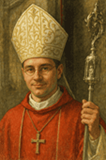
Inscrit le: 28 Nov 2018
Messages: 1751
Localisation: In viaggio
|
 Posté le: Mar Fév 25, 2025 6:25 pm Sujet du message: Posté le: Mar Fév 25, 2025 6:25 pm Sujet du message: |
 |
|
Nella maestosa Basilica di San Tito, il sole filtrava attraverso le vetrate, creando un gioco di luci e ombre che conferiva un'aura sacra all'ambiente. La navata centrale si stava riempiendo di fedeli, ecclesiastici e dignitari giunti da ogni angolo del mondo per rendere omaggio al fu Cardinale Urbain Mastiggia. Sua Eminenza Ettore Asburgo d'Argovia, Cardinale Presbitero di San Barnaba a Ripa, seguiva con passo misurato il Decano del Collegio Cardinalizio, Sua Eminenza Hohenzollern-Habsburg, verso i posti a loro assegnati.
Il volto del Cardinale Asburgo d'Argovia era segnato da un'emozione di sincero e profondo rammarico, poiché non aveva mai avuto la possibilità di approfondire la conoscenza del defunto. Tuttavia, stretto nelle sue vesti color rubino, sentiva un senso di sicurezza e pace nel trovarsi vicino alla sua comunità, fatta di individui tanto diversi quanto uniti nell'eterogenesi dei fini divini. Con un po' di coraggio, cercò di individuare qualche altro cardinale italiano, magari l'anziana Eminenza Foscari o l'energetica Eminenza Sforza, ai quali tanto doveva in termini di crescita personale e maturazione di carattere.
Improvvisamente, il suo sguardo si posò sul feretro del Cardinale Mastiggia, e la disarmante semplicità della morte lo colpì come un pugno nello stomaco. Il volto di Padre Ettore impallidì, sentì un nodo formarsi in gola mentre fissava il feretro del suo collega. Sapeva che doveva mantenere la compostezza per il bene della comunità che si era radunata in quella magnifica basilica, ma l'ondata di emozione era difficile da contenere.
Guardò verso i fedeli e riconobbe nei loro volti la stessa mistura di dolore e speranza che stava provando. In essi e nell'amore divino trovò ancora una volta la forza di continuare.
-----
In the majestic Basilica of San Tito, the sun filtered through the stained glass windows, creating a play of light and shadow that bestowed a sacred aura upon the environment. The central nave was filling up with faithful, clergy, and dignitaries who had come from every corner of the world to pay homage to the late Cardinal Urbain Mastiggia. At the same time, His Eminence Ettore Asburgo d'Argovia, Cardinal Priest of San Barnaba a Ripa, followed the Dean of the College of Cardinals, His Eminence Hohenzollern-Habsburg, towards their assigned seats.
The face of Cardinal Asburgo d'Argovia was marked by an emotion of sincere and profound regret, for he had never had the opportunity to deepen his acquaintance with the deceased. However, wrapped in his ruby-colored vestments, he felt a sense of security and peace being close to his community, made up of individuals so diverse yet united in the heterogenesis of divine purposes. With a bit of courage, he tried to identify some other Italian cardinals, perhaps the elderly Eminence Foscari or the energetic Eminence Sforza, to whom he owed so much in terms of personal growth and character maturation.
Suddenly, his gaze fell upon the coffin of Cardinal Mastiggia, and the disarming simplicity of death hit him like a punch in the stomach. Father Ettore's face paled, and he felt a lump forming in his throat as he stared at the coffin of his colleague. He knew that he had to maintain his composure for the sake of the community that had gathered in that magnificent basilica, but the wave of emotion was difficult to contain.
He looked towards the faithful and recognized in their faces the same mixture of pain and hope that he was experiencing. In them and in the divine love, he once again found the strength to continue.
_________________
+ Ettore Asburgo D'Argovia
Cardinale-Presbitero di San Barnaba a Ripa
Decano del Tribunale della Rota Romana
Ufficiale dell'Ordine pontificio di Nicola V
 |
|
| Revenir en haut de page |
|
 |
Marilyse

Inscrit le: 25 Fév 2020
Messages: 750
|
 Posté le: Mar Fév 25, 2025 6:45 pm Sujet du message: Posté le: Mar Fév 25, 2025 6:45 pm Sujet du message: |
 |
|
Marilyse s’était faite accompagner de sa suivante et amie Rachel. Elle était fatiguée d’une part, ayant énormément de travail dans son diocèse, et peinée. Bien qu’elle n’ait que peu connu Son Éminence, c’était un collègue dont elle estimait à leur juste valeur la rigueur, la compétence et le dévouement à l’Église ainsi qu’à la Vraie Foi. Et c’était un frère d’armes dans la bataille contre les fausses croyances, les faux semblants, les agressions continuelles contre l’Église.
Une part d’elle lui disait qu’il avait mérité un juste repos auprès du Très-Haut qu’il avait servi avec abnégation. L’autre part éprouvait simplement un profond chagrin pour cette perte. C’est donc l’air grave, contrastant de façon saisissante avec sa sérénité et sa jovialité habituelles, qu’elle entra dans le lieu saint. Les salutations furent très discrètes, et elle alla prendre place là où la jeune évêque de Clermont se devait trouver selon son rang.
*********************
Marilyse was accompanied by her servant and friend Rachel. She was tired on the one hand, as she had a lot of work to do in her diocese, and saddened on the other. Although she did not know His Eminence well, he was a colleague whose rigour, competence and devotion to the Church and the True Faith she valued highly. And he was a brother in arms in the battle against false beliefs, false pretence and the constant attacks on the Church.
Part of her was telling her that he had earned a just resting place with the Most High, whom he had served with self-sacrifice. The other part was simply deeply saddened by his loss. So it was with a grave air, in striking contrast to her usual serenity and joviality, that she entered the holy place. The greetings were very discreet, and she took her place where the young bishop of Clermont should be according to her rank.
_________________
 |
|
| Revenir en haut de page |
|
 |
marco_depolis
Inscrit le: 16 Mai 2019
Messages: 781
|
 Posté le: Mer Fév 26, 2025 5:01 pm Sujet du message: Posté le: Mer Fév 26, 2025 5:01 pm Sujet du message: |
 |
|
The Basilica of St. Titus was shrouded in solemn silence, broken only by the choir's song and the soft rustle of liturgical robes gliding across the marble floor. The vice primate advanced with measured steps, his face marked by a grave and contemplative expression. He had not known Urbain Mastiggia personally, but had followed his path, heard his name whispered in the corridors of ecclesiastical power, and admired his intelligence and dedication.
His gaze settled on the coffin, nestled between the flickering light of the candles and the golden reflection of the altar's decorations. The death of a cardinal was not merely the loss of a man, but of a piece of the Church itself, a pillar collapsing, leaving others to bear the weight of the structure.
Marco made the sign of the cross, letting the requiem imprint itself upon his soul. Kalixtus' voice rose, carrying with it the final sense of that ceremony: not only mourning, but also hope. Hope that death was not an end, but a transition; that the service rendered to the Church would not fade with earthly life, but would take root, becoming a spiritual legacy for generations to come.
He took his place among the preludes gathered to pay their respects. Around him, hushed voices murmured prayers, and the very breath of the Basilica seemed suspended between sorrow and eternity. Marco lowered his head, joining his silence with that of the multitude. In that moment, he understood that the truest tribute to Urbain Mastiggia was not in words, but in continuing to serve the Church with the same zeal, the same unwavering faith.
_________________

+ Reverend Monsignor Marco Ibleto Polo d'Oria Borbone
---------- Archbishop of Genova | Vice Primate of the Holy Roman Empire | Bishop of Trento |
|
| Revenir en haut de page |
|
 |
Louis_saint_prigent

Inscrit le: 21 Mar 2024
Messages: 41
Localisation: Aix, comté de Provence
|
 Posté le: Jeu Fév 27, 2025 12:54 pm Sujet du message: Posté le: Jeu Fév 27, 2025 12:54 pm Sujet du message: |
 |
|
Les cloches de la basilique Saint-Titus résonnaient avec une gravité solennelle, emplissant l’air d’une vibration profonde, comme une réponse céleste aux prières muettes des fidèles rassemblés.
Le Père Louis était arrivé sans faste, tel un humble pèlerin venu se recueillir. Il n’avait jamais croisé le chemin de Son Éminence Urbain Mastiggia, mais la nouvelle de son décès avait franchi les frontières et atteint Aix. Il ne connaissait de lui que son nom, la réputation d’un serviteur inflexible de l’Église, un guide dont l’influence s’était répandue. Un cardinal n’était jamais seulement un homme : il était une voix, un phare, une pierre angulaire sur laquelle le temps s’appuyait pour bâtir l’histoire.
Louis franchit le seuil de la nef monumentale, laissant son regard errer sur les visages graves des prélats alignés en silence. Prenant place parmi les membres du clergé, légèrement en retrait, il observa un instant le sarcophage, trônant sous l’immensité de la coupole.
Un silence pesant enveloppait l’assemblée, les âmes oscillaient entre le poids du deuil et la sérénité de la foi. Car au-delà des larmes et des pertes, demeurait cette vérité inébranlable : si les hommes s’effacent, l’Église, elle, demeure.
_________________
 |
|
| Revenir en haut de page |
|
 |
Cactaceae

Inscrit le: 03 Déc 2011
Messages: 495
Localisation: Orbetello - Parroco
|
 Posté le: Jeu Fév 27, 2025 5:59 pm Sujet du message: Posté le: Jeu Fév 27, 2025 5:59 pm Sujet du message: |
 |
|
Mons. Cactaceae arrivò a piedi come di suo costume e a pochi passi dalla basilica di S. Tito trovò una locanda in cui ristorarsi, darsi una lieve rinfrescata dopo il lungo e polveroso cammino e cambiarsi d'abito, tirando fuori dalla sacca degli abiti eleganti e riponendo i vestiti da viaggio.
Entrò quindi nella Basilica di San Tito, si avvicinò al feretro e sussurrò una breve preghiera, poi andò nella zona riservata ai sacerdoti e rimase in attesa.
Mons. Cactaceae arrived on foot, as was his custom, and a few steps from the Basilica of St. Titus, he found an inn where he could refresh himself, take a slight freshening up after the long and dusty journey, and change his clothes, pulling out elegant garments from his bag and putting away his travel clothes.
He then entered the Basilica of St. Titus, approached the coffin, and whispered a brief prayer. Then he went to the area reserved for priests and waited.
_________________
 |
|
| Revenir en haut de page |
|
 |
Cinead
Cardinal


Inscrit le: 17 Fév 2018
Messages: 1098
Localisation: Twynholm, Scotland
|
 Posté le: Ven Fév 28, 2025 7:55 pm Sujet du message: Posté le: Ven Fév 28, 2025 7:55 pm Sujet du message: |
 |
|
Bishop Cinead of Twynholm stood within the grand confines of the Basilica of Saint Titus, his heart weighted with a solemn respect as he prepared to pay his respects at the funeral of Cardinal Urbain Mastiggia. Though the Scottish bishop had never personally met the French Cardinal, the late prelate's reputation as a steadfast servant of the Aristotelian Church had resonated deeply with Cinead, prompting him to undertake this journey. As Cinead walked through the basilica’s majestic archways, the air was thick with the scent of incense, a testament to the ongoing rites honoring the deceased. The vast interior of the basilica hummed with the low, murmured prayers of the many attendees, each reflecting on the life and service of Cardinal Mastiggia. Standing there among his fellow clerics, Cinead felt a profound sense of unity and purpose, a reaffirmation of his own vocation in the sprawling tapestry of the Aristotelian faith.
_________________

Chartulary of the British Islands, Bishop of Whithorn, Archivist for the Registers, Translator at Order of Saint Jerome, Theologian at the Holy Office 🏴 |
|
| Revenir en haut de page |
|
 |
Adonnis
Cardinal


Inscrit le: 19 Jan 2018
Messages: 5209
Localisation: Monte Real/Leiria - Palazzo Taverna/Roma
|
 Posté le: Ven Fév 28, 2025 11:11 pm Sujet du message: Posté le: Ven Fév 28, 2025 11:11 pm Sujet du message: |
 |
|
It was not a pleasant day; after all, the Church had lost a valuable brother.
Though they had never maintained a particularly personal relationship, Adonnis had always recognized and valued the French Cardinal’s energy and focus in defending the Faith and his pastoral work.
Adonnis wore a black cassock, with only a crimson red sash representing his cardinalatial dignity, along with a black silk Ferraiolo.
With few adornments, the Cardinal bore only a silver pectoral cross encrusted with black sapphires.
Upon entering the Basilica, the Cardinal paused for a moment before Urbain’s sarcophagus and reflected silently.
His face showed no reaction beyond a solemn and discreet expression. His green eyes, like glass, seemed to reach far beyond the body lying before him.
After a few moments, the Cardinal made his way to the seats reserved for Cardinals and waited silently for the ceremony to begin.
---
Ce n'était pas une journée agréable, après tout, l'Église avait perdu un frère précieux.
Bien qu'ils n'aient jamais entretenu une relation particulièrement personnelle, Adonnis avait toujours reconnu et apprécié l'énergie et la concentration du cardinal français dans la défense de la Foi et dans son travail sur le terrain.
Adonnis portait une soutane noire, avec seulement une ceinture rouge cramoisie, représentant la dignité cardinalice, ainsi qu'un ferraille en soie noire.
Avec peu d'ornements, le cardinal portait uniquement une croix pectorale en argent incrustée de saphirs noirs.
En entrant dans la basilique, le cardinal s'arrêta un instant devant le sarcophage d'Urbain et réfléchit silencieusement.
Son visage ne montrait aucune réaction, à part un ton solennel et discret. Ses yeux verts, comme du verre, semblaient atteindre quelque chose bien au-delà du corps qui gisait devant lui.
Après quelques instants, le cardinal se dirigea vers les places réservées aux cardinaux et attendit silencieusement le début de la cérémonie.
_________________

.....Cardinal-Presbyter of Saint Anthony of the Portuguese / Grand Audiencier of the Holy See / General Inquisitor of Portugal
...............Primate of Portugal / Metropolitan Archbishop of Braga / Bishop of Vila Real / Duke of Monte Real |
|
| Revenir en haut de page |
|
 |
Francesco_maria
Cardinal

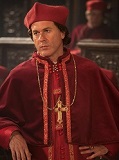
Inscrit le: 14 Jan 2013
Messages: 3908
|
 Posté le: Lun Mar 03, 2025 11:55 am Sujet du message: Posté le: Lun Mar 03, 2025 11:55 am Sujet du message: |
 |
|
In a certain sense, Cardinal Sforza had not yet accepted the death of his brother. In the previous days he had somehow repressed the idea of the death of Card. Mastiggia and had continued to work in his offices as if nothing had happened, as if his French brother had simply left for a trip. Their friendship had strengthened in recent years and both had shared efforts and points of view on the Kingdoms and the Church. While he was still absorbed in his thoughts, the secretary approached him and said:
"Your Eminence, it is time to leave for the funeral of Cardinal Mastiggia in Saint Titus".
Those words immediately brought him back to reality. He rose from his chair, adjusted his habit and, without saying a word, set off. His residence was a few steps from the Basilica and even though the day was sunny and the scents of spring could already be felt in the air, the cardinal did not open his mouth or look up at the sky.
Having entered in Saint Titus, he was accompanied to his place near the other cardinals, and sat down. He gathered in prayer while waiting for the funeral rite to begin."
_________________
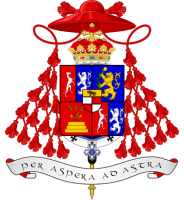 |
|
| Revenir en haut de page |
|
 |
Fenice
Cardinal

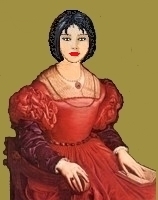
Inscrit le: 19 Déc 2010
Messages: 12333
|
 Posté le: Lun Mar 03, 2025 9:10 pm Sujet du message: Posté le: Lun Mar 03, 2025 9:10 pm Sujet du message: |
 |
|
The huge Basilica was slowly filling up, the colours of the robes and the buzz of voices filled eyes and ears.
Cardinal Fenice had entered St Titus so many times... for festive and sad occasions, formal or more intimate, she knew every corner, every sumptuous decoration, every sign of the power of the Church and the depth of the Aristotelian Faith.
As she unhurriedly reached her seat, she thought with sadness about the reason for that day.
She had not known Urbain Mastiggia well, but she knew how much he had worked for the Church, and how his departure had deprived the Curia of a very valuable element.
She thought of the cardinals who had died, how different they had been from one another, but all equally important.
She let her thoughts and memories wander freely, waiting for the beginning, offering to the Most High everything that crossed her mind.
_________________
 |
|
| Revenir en haut de page |
|
 |
Neuven

Inscrit le: 17 Juil 2022
Messages: 93
|
 Posté le: Jeu Mar 06, 2025 8:11 pm Sujet du message: Posté le: Jeu Mar 06, 2025 8:11 pm Sujet du message: |
 |
|
Neven avait fait la route pour assister à la messe en la cathédrale en l'honneur de Urgain qui les avait quittés. Elle ne le connaissait que peu, mais sa mère Ellesya l'avait connu, alors elle était venu en soutien à ses frères et soeurs religieux, mais aussi pour représenter sa mère.
Elle pénétra dans le lieu majestueux, se signa et prit place parmi les présents. Elle trouvait normal d'assister à cette cérémonie.
------------------------
Neven had travelled to the cathedral to attend mass in honour of Urgain, who had left them. She didn't know him very well, but her mother Ellesya had known him, so she had come to support her religious brothers and sisters, but also to represent her mother.
She entered the majestic building, signed herself in and took her place among those present. She felt it was only right to attend this ceremony.
_________________
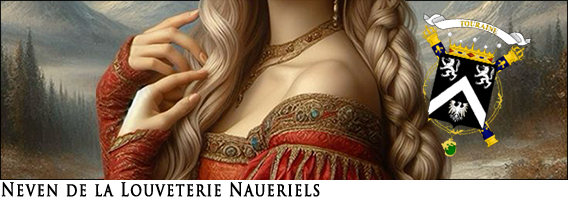
Fille d'une Walkyrie & d'un Aigle. Petite fille d'une Louve
~~ Diaconesse de Tours ~~ Duchesse de Ussé ~ |
|
| Revenir en haut de page |
|
 |
Kalixtus
Cardinal


Inscrit le: 24 Fév 2013
Messages: 15421
Localisation: Roma, Palazzo Doria-Pamphilj
|
 Posté le: Sam Mar 08, 2025 3:51 pm Sujet du message: Posté le: Sam Mar 08, 2025 3:51 pm Sujet du message: |
 |
|
The tolling bells of the mighty basilica announced the beginning of the ceremony, which commenced with the Introitus Requiem æternam:
Requiem æternam dona eis, Domine,
et lux perpetua luceat eis.
Te decet hymnus, Deus, in Sion,
et tibi reddetur votum in Jerusalem.
Exaudi orationem meam,
ad te omnis caro veniet.
Kalixtus joined the procession as celebrant, moving through the nave of the basilica towards the high altar, accompanied by a multitude of acolytes and ministers. At the forefront, the mighty golden cross was carried, symbolizing the unity of the teachings of Christos and Aristotle, a sign of faith that every Aristotelian could wear as a medallion around their neck.
Torchbearers followed, embodying the light of the prophets' wisdom, and the bearer of the great annual candle, the flame of faith. Then came those carrying the Turibulum with its censer and the Aspergil with holy water.
Next in the procession was the bearer of the sacred Dogma, bound in gold—usually a deacon of the Roman diocese—followed by other priests and deacons assisting in the liturgy, until finally, the celebrants arrived, with their bishop’s staffs, followed by the Baculifer and Mitrapher, the assisting hands carrying the mitre or crosier when needed.
The grand entrance into the basilica halted before the coffin. Kalixtus sprinkled it with holy water and thrice swung the Turibulum towards the black casket, bowing before the deceased and his life’s work.
Then he stepped forward to the altar, bowed before it, and made the sign of the cross.
E nomine Deus et due prophetae Aristoteles et Christos. Amen.
Ascending the steps to the high altar, he removed his mitre and handed his crosier to the Baculifer, before kissing the Dogma and placing it upon the altar.
By now, the Introitus had ended, and the choir fell silent.
Kalixtus raised his voice, a voice like mighty waters, resounding through the basilica, flooding its sacred halls for the first time with his words:
Beloved brothers and sisters in the Lord,
A heavy veil of sorrow has fallen upon us, and the wind of death blows cold through this sacred hall. Today, we stand at the precipice of the earthly, at the threshold of eternity, where words fail, and only the silence of prayer can still speak. Cardinal Urbain Mastiggia—our brother, our companion, our teacher—has been taken from us, called away by the hand of the One who alone is Lord over life and death.
But has he truly been taken from us? Or is it rather that what we believed lost now finds its true meaning?
For behold: Death is not the end but the revelation of the beginning. It is not oblivion but the crowning of life—not destruction, but the final consecration of existence. What would our life be if it were not mortal? An endless wandering, a purposeless drifting, trapped in the repetition of the same. Only death grants life its value. Only in the knowledge of the end does every breath gain meaning, every moment depth, every decision weight.
Our brother Urbain knew this. He knew that existence on this earth is a fleeting light, brief as the shimmer of a star, yet woven into the infinite order of God. He did not live as if he were immortal—no, he lived with the burning certainty that all he did was weighed by God, measured, and preserved in eternity.
And so, we must grieve—yes, for our hearts are weak, and the pain of loss pierces us like a two-edged sword. We grieve because we love, and in love, we hear the echo of eternity. Yet we must not despair, for Urbain’s life was a testimony of hope, a beacon of faith, a service in the tireless expectation of divine glory.
Here, in the heart of the Aristotelian world, beneath these venerable vaults where the echoes of centuries resound and the prayers of the saints rise like incense, we commend him into the hands of the Most High. Not with a lament of doubt, but with a hymn of trust. Not as one lost, but as one returned home. Not with the bitterness of separation, but with the certainty of reunion.
For if we bury the body, we do not bury the soul. If we close our eyes, we do not close the memory. If we fall silent, we do not silence hope.
O Lord, You have called him, just as one day You shall call us. Teach us to live as he lived—in reverence for death—so that we may one day be found worthy to enter Your kingdom.
Requiescat in pace, Cardinal Urbain Mastiggia. Amen.
A moment of silence followed, as his solemn words, spoken with his deep, melodic voice, faded into the vastness of the basilica. Then, he spoke again:
Let us pray together:
Almighty and eternal God,
You are the origin and the goal of our lives,
the beginning without beginning, the end without end.
Into Your hands, we commend today the soul of Your servant,
our brother, Cardinal Urbain Mastiggia.
You have called him from the darkness of the earthly realm
into the radiant light of Your presence.
Do not extinguish his light, but rekindle it anew
in the glory of Your everlasting love.
Lord, we loved him,
we prayed with him, suffered, and hoped.
Now his place among us is empty,
but fill it with the certainty
that nothing is lost in You.
Grant him the peace of the blessed,
the rest of the saints,
the joy of the redeemed.
Cleanse him of all sin,
receive him into Your heavenly kingdom,
where there is no more pain, no night, no end,
but only the radiant countenance of Your divine self.
Amen.

Les puissantes cloches de la basilique retentirent, annonçant le début de la cérémonie, qui s'ouvrit avec l'Introït Requiem æternam :
Requiem æternam dona eis, Domine,
et lux perpetua luceat eis.
Te decet hymnus, Deus, in Sion,
et tibi reddetur votum in Jerusalem.
Exaudi orationem meam,
ad te omnis caro veniet.
Kalixtus rejoignit la procession en tant que célébrant, avançant à travers la nef de la basilique en direction du maître-autel, accompagné d’une multitude d’acolytes et de ministres. En tête, la puissante croix d’or était portée, symbole de l’unité des enseignements de Christos et Aristote, un signe de foi que tout aristotélicien pouvait porter en médaillon autour du cou.
Des porteurs de flambeaux suivaient, incarnant la lumière de la sagesse des prophètes, ainsi que le porteur de la grande bougie annuelle, flamme de la foi. Puis venaient les porteurs du Turibulum avec son encensoir et ceux de l’Aspergil avec l’eau bénite.
Derrière eux avançait le porteur du saint Dogme, relié d’or – généralement un diacre du diocèse romain –, suivi d’autres prêtres et diacres assistant à l’office, jusqu’à l’arrivée des célébrants, tenant leurs crosses épiscopales, suivis du Baculifer et du Mitraphor, aides chargés de porter la mitre ou la crosse lorsque nécessaire.
La grande entrée dans la basilique s’arrêta devant le cercueil. Kalixtus le bénit d’eau lustrale et fit trois mouvements d’encens en direction du cercueil noir, avant de s’incliner devant le défunt et l’œuvre de sa vie.
Puis il s’avança vers l’autel, s’inclina devant lui et fit le signe de la croix.
E nomine Deus et due prophetae Aristoteles et Christos. Amen.
Gravissant alors les marches du maître-autel, il retira sa mitre et remit sa crosse au Baculifer, avant de baiser le Dogme et de le déposer sur l’autel.
L’Introït était désormais achevé, et le chœur s’éteignit.
Kalixtus éleva la voix, une voix puissante comme les eaux vives, résonnant sous les voûtes de la basilique, emplissant pour la première fois ces murs de ses paroles :
Bien-aimés frères et sœurs dans le Seigneur,
Un lourd voile de deuil s’est abattu sur nous, et le vent de la mort souffle froidement à travers cette sainte nef. Aujourd’hui, nous nous trouvons au bord du terrestre, au seuil de l’éternité, là où les mots s’effacent et où seule demeure la prière silencieuse. Le cardinal Urbain Mastiggia – notre frère, notre compagnon, notre maître – nous a été enlevé, rappelé par la main de Celui qui seul règne sur la vie et la mort.
Mais nous a-t-il vraiment été ôté ? Ou bien est-ce plutôt que ce que nous croyions perdu trouve maintenant son véritable sens ?
Car voyez : la mort n’est pas une fin, mais la révélation du commencement. Elle n’est pas l’oubli, mais la couronne de la vie, non pas l’anéantissement, mais la consécration ultime de l’existence. Que serait la vie sans la mort ? Une errance infinie, une dérive sans but, prisonnière de la répétition du même. Seule la mort donne à la vie sa valeur. C’est dans la conscience de sa fin que chaque souffle prend son sens, que chaque instant gagne en profondeur, que chaque choix s’alourdit de son propre poids.
Notre frère Urbain le savait. Il savait que l’existence terrestre est un éclat de lumière, fugace comme l’éclat d’une étoile, mais inscrit dans l’ordre infini de Dieu. Il ne vécut pas comme s’il était immortel – non, il vécut dans la certitude ardente que tout ce qu’il accomplissait était pesé par Dieu, mesuré et conservé pour l’éternité.
Et ainsi, nous devons pleurer – oui –, car nos cœurs sont faibles et la douleur de la perte nous transperce tel un glaive à double tranchant. Nous pleurons parce que nous aimons, et dans l’amour résonne l’écho de l’éternité. Mais nous ne devons pas désespérer, car la vie d’Urbain fut un témoignage d’espérance, un phare de foi, un service rendu dans l’attente inlassable de la gloire divine.
Ici, au cœur du monde aristotélicien, sous ces voûtes vénérables où résonne l’écho des siècles et où les prières des saints montent comme l’encens, nous le remettons entre les mains du Très-Haut. Non dans une plainte de doute, mais dans un hymne de confiance. Non comme un perdu, mais comme un fils rentré chez lui. Non avec l’amertume de la séparation, mais avec la certitude des retrouvailles.
Car si nous ensevelissons le corps, nous ne le faisons pas pour l’âme. Si nous fermons nos yeux, ce n’est pas pour la mémoire. Si nous nous taisons, ce n’est pas pour l’espérance.
Ô Seigneur, Tu l’as appelé, comme un jour Tu nous appelleras tous. Apprends-nous à vivre comme il a vécu – dans la révérence de la mort – afin qu’un jour nous soyons jugés dignes d’entrer dans Ton royaume.
Requiescat in pace, Cardinal Urbain Mastiggia. Amen.
Un moment de silence suivit, tandis que ses paroles solennelles, portées par sa voix grave et mélodieuse, se fondaient dans l’immensité de la basilique. Puis il reprit la parole :
Prions ensemble :
Dieu tout-puissant et éternel,
Tu es l’origine et la finalité de notre vie,
le commencement sans commencement, la fin sans fin.
Entre Tes mains, nous remettons aujourd’hui l’âme de Ton serviteur,
notre frère, le cardinal Urbain Mastiggia.
Tu l’as appelé hors des ténèbres du monde
pour le conduire dans la lumière éclatante de Ta présence.
Ne laisse pas sa lumière s’éteindre, mais ravive-la,
dans la gloire de Ton amour impérissable.
Seigneur, nous l’avons aimé,
nous avons prié avec lui, souffert et espéré.
À présent, sa place parmi nous est vide,
mais remplis-la de la certitude
que rien ne se perd en Toi.
Accorde-lui la paix des bienheureux,
le repos des saints,
la joie des élus.
Purifie-le de toute faute,
reçois-le dans Ton royaume céleste,
où il n’y a ni douleur, ni nuit, ni fin,
mais seulement la splendeur de Ton visage divin.
Amen.
_________________
 |
|
| Revenir en haut de page |
|
 |
|
|
Vous ne pouvez pas poster de nouveaux sujets dans ce forum
Vous ne pouvez pas répondre aux sujets dans ce forum
Vous ne pouvez pas éditer vos messages dans ce forum
Vous ne pouvez pas supprimer vos messages dans ce forum
Vous ne pouvez pas voter dans les sondages de ce forum
|
|





























